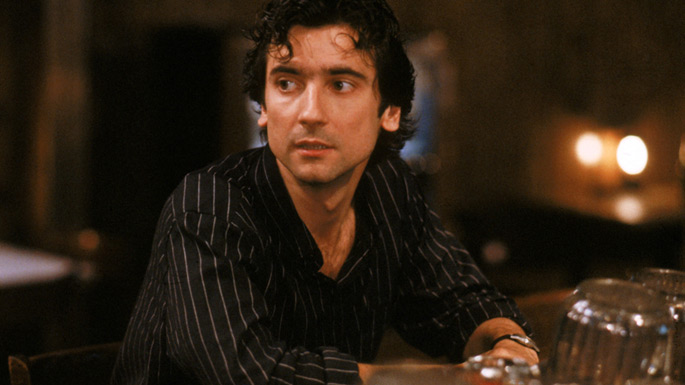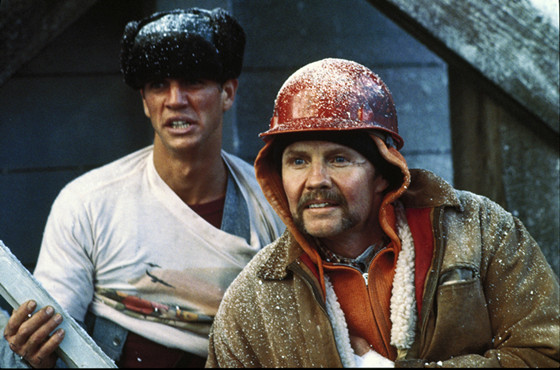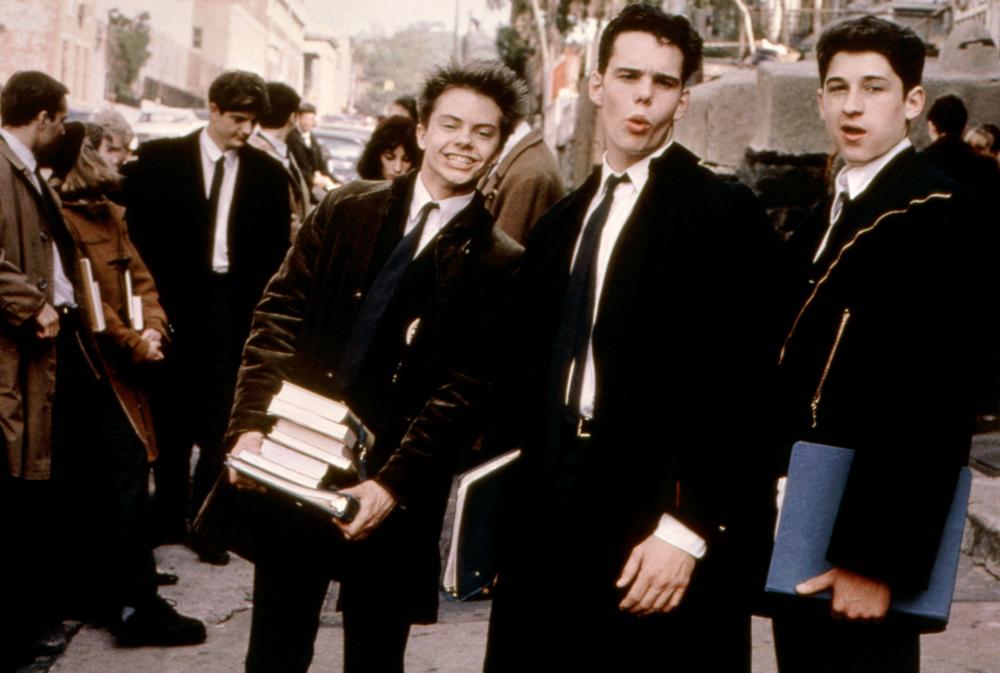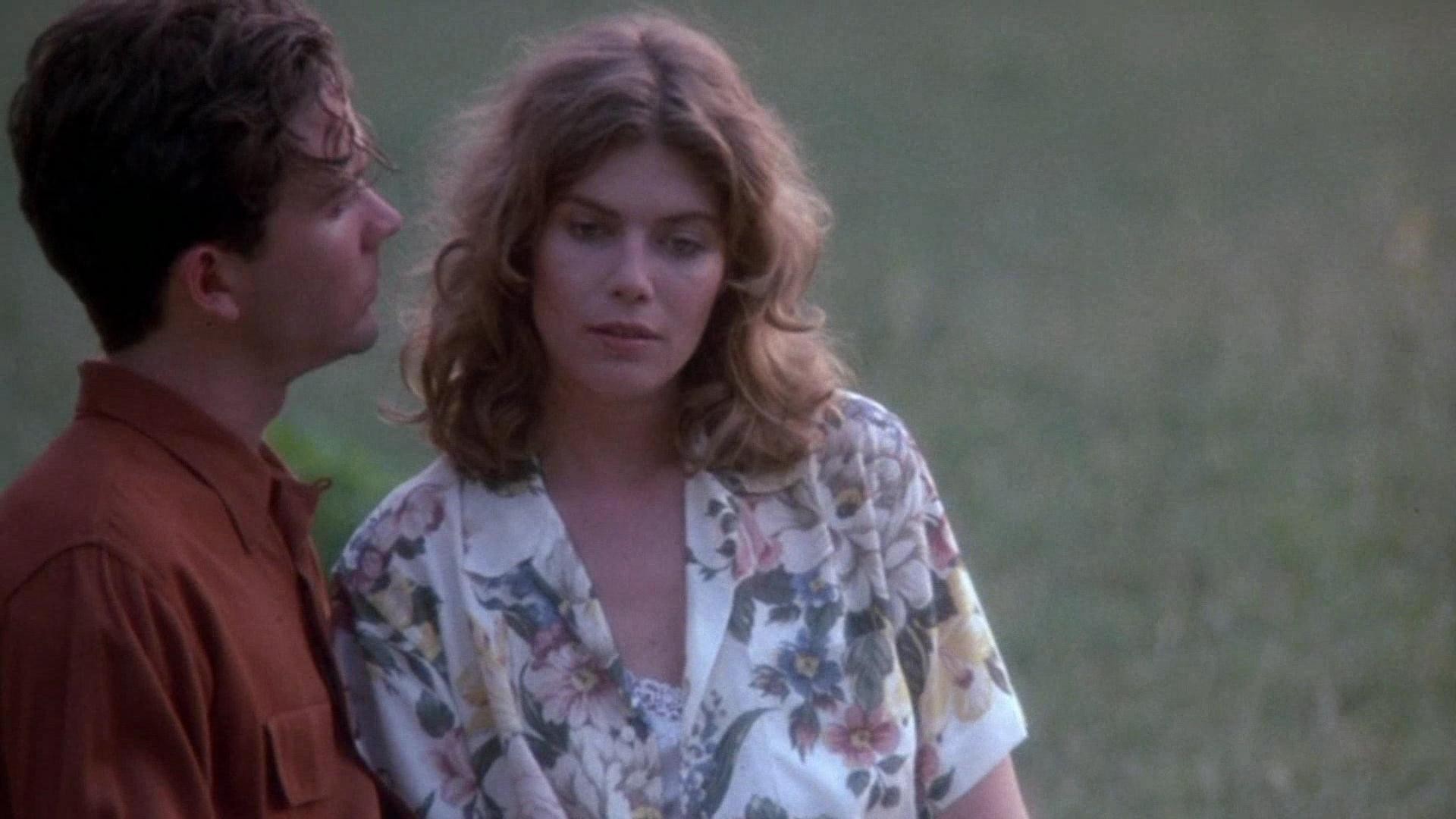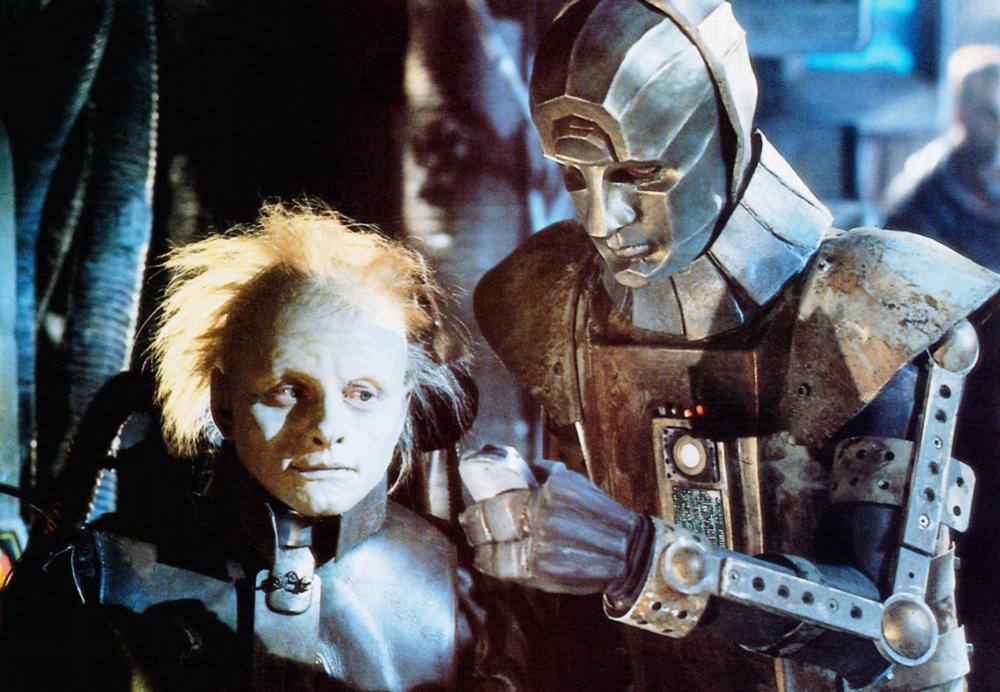11. After Hours (1985)
Few have had a film career like Marty Scorsese.
Known mainly for his crime dramas, in 1985 he directed this twisted love letter to New York City. One of the blackest of black comedies, it follows “Paul Hackett,” played to perfection by Griffin Dunne, on a series of escalating misadventures during a date gone horribly wrong. (Curiously, Blake Edwards would take a stab at this sub-genre with less success 2 years later in Blind Date (1987) with Bruce Willis as the erstwhile foil.)
New York City — and all of its faults and intricately intertwined habits — is as much a character as any human. Shot by the great German-born Michael Balhaus, they city glows in crystalline whites and concrete-and-asphalt jungle blues.
So likeable is Griffin Dunne, that when things start going wrong you really, really feel sorry for him. Marty Scorsese ratchets up the suspense to a degree that is truly life-threatening for the lead character. The film is best when seen with true New Yorkers. It’s not surprising the film didn’t find an audience outside of it but that certainly doesn’t mean it can’t find a healthy life elsewhere.
I like Marty Scorsese’s non-crime films very much. Alice Doesn’t Live Here Anymore (1974), The Last Waltz (1978), The Color of Money (1986), The Last Temptation of Christ (1988), The Age of Innocence (1993), Kundun (1997), and even the flawed Hugo (2011), all have a special, exuberant way about them. Scorsese, like Kubrick once did, lives, breathes, and sleeps films. He is single-mindedly obsessed with films and filmmaking and we are the beneficiaries of his craft.
12. Runaway Train (1985)
This long-developed project by famed Japanese director Akira Kurosawa dated back to the 70s and was postponed many times. It was picked up by Golan-Globus, an Israeli-owned studio who produced over 200 films through their production house Cannon Films. Russian Andrey Konchalovskiy (as Andrei Konchalovsky) had been directing a number of features for them and picked up this assignment. It’s a tough, man’s man of a film, that doesn’t shrink or wilt.
The title says it all — two fugitives and one railway worker are caught on a runaway train speeding to oblivion and all attempts to stop it fail. The films stars Jon Voight as “Oscar ‘Manny’ Manheim” (what a great name!), Eric Roberts as “Buck McGeehy,” and Rebecca De Mornay as “Sara.” It’s a tough, gritty, extremely realistic and violent film that pits iron will against mechanized steel with dire consequences for all.
The final image is unforgettable. I know that’s a cliché but this one truly is. And you have to admire a film that fades out into a Shakespeare quote: “No beast so fierce but knows some touch of pity.” “But I know none, and therefore am no beast.”
13. Heaven Help Us (1985)
Catholic school the way we like to remember it. One wonders how Marty Scorsese would have directed this picture. Sadly we’ll never know.
What we do have is wonderful film that both satirizes and loves its subject matter. It neither condemns nor celebrates a variety of cinematic tropes and Catholic stereotypes. It is, at its heart, a coming of age film from a particular neighborhood in Brooklyn where everyone knew each other that is both bittersweet and real, where everyone is on the precipice of change (it takes place in 1965) that no one wants but everyone realizes is inevitable. At the time, can you really blame the Church for wanting to stick to older, traditional ways just a little bit longer?
This ensemble films introduces a whole host of young faces near or at the beginning of their careers, in addition to well-established stars. Wallace Shawn, one of the greatest character actors ever, gives a particularly memorable — when does he not! — performance as one of the priests.
The ongoing pedophilia scandal has rocked the Catholic Church in ways that may be insurmountable. It is no longer the innocent it was once thought to be. So it’s hard to look at this film with an unprejudiced eye and laugh at its trivial inside jokes and the peculiarities of the Catholic educational system at the time, which by some accounts and for some teachers, very strict, even cruel. For those who went through it, painful memories could surface. Some may even think the Church deserves its current punishment.
But that kind of reaction means the film, for all its pretense as a comedy, was very real and truthful. No religion has a monopoly on virtue. If you can get beyond the scandal, please try to watch this film more universally and from the kid’s perspective, as they merge into life away from the protective bonds of school, scared and frightened, putting on a good face, and pretending to be much adult than they really are, before war, the vicissitudes of life, and bad luck take the toll.
In fact, this film is a very real examination of life beyond the brownstone-walled protection of schools. We never realize how good we had it then. The harsh, disciplinary standards exhibited by some teachers was, paradoxically, their archaic way of preparing for the harshness of life.
Many of the young adults in this picture were at the beginnings of their now long careers. Mary Stuart Masterson is especially good. And Kevin Dillon hasn’t changed one iota. We see Patrick Dempsey — McDreamy! — in his first film role. For a small film, there are a number of big stars as well — Donald Southerland, John Heard, Philip Bosco, and the aforementioned Wallace Shawn inimitable comic genius.
This film deserves to be remembered for the depiction of a very specific time in America’s history on the precipice of a lost innocence. Kennedy was dead. The war in Viet Nam was picking up. And few knew what tomorrow would hold.
14. Made in Heaven (1987)
A mysterious, enveloping, love story about heaven, reincarnation, taking extraordinary chances, the beauty of innocence, and the value of a life lived full.
On a journey to California to start a new life away from his small hometown, Mike Shea (played by Timothy Hutton) is killed while trying to save a family from drowning. Now in heaven he falls in love Annie Packert (a resplendent Kelly McGillis, her first role after Top Gun). Unfortunately, she is sent to earth to earn her “wings.” Despondent once again, Mike is offered a deal — he can return to earth as a baby with no memory and, if he can find Annie again — his one true love — within 30 years, he can stay, build a life with her, and live a happy, long, natural life.
It features cameos by several, iconic rock musicians such as Tom Petty, Ric Ocasek, and Neil Young. An almost unrecognizable Debra Winger appears as an angel of heaven.
This film is a parable, a mythic journey of an Parsifalian innocent through the trials and tribulations of life on a hero’s quest — and he doesn’t even know it. Written by Bruce Evans, he was ridding a wave of great films he wrote that included Starman (1984) and Stand Be Me (1986) — two other “journey” pictures of incomparable greatness.
Made in Heaven never found an audience and faded from view. Rarely shown on TV, it has been available on DVD since 2009. Seek out this modest, extraordinary film.
15. Adventures of Baron Munchausen (1988)
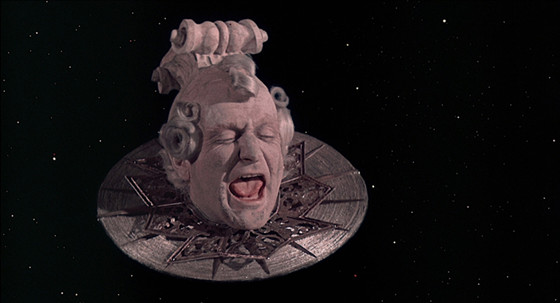
This is Terry Gilliam at the height of his powers, following a string of mega-hits, when the studio gave him carte blanche to make his dream project.
Epic in scope, it is based on the Germanic myths and fables of 18th-century nobleman Baron Munchausen. Containing scenes of war with the Turks (the Ottoman Empire), flights to the moon, undersea adventures in the belly of the beast, and a group of friends with long-dormant super-human powers, this film failed completely with American audiences.
Not even a naked Uma Thurman, in one of her first screen roles, or the comedic super-star status of Monty Python’s regulars or Robin Williams could overcome the lack of interest. Critics, on the other hand, loved it.
There was no reason any studio executive would think Munchausen would be anything but a success, given Gilliam’s track record and the world-wide notoriety of Monty Python, even taking into consideration cultural differences and snobbery aside. Its distinct lack of success is a real mystery.
One suspects a British director and quintessentially British satirical acting troupe making a film based on very obscure German fables was too much to ask for. It didn’t do well overseas either. Suffering a very, very limited release due to very poor box office, few saw it and soon the studio pulled the plug, not wanting to bleed more money than the $45 million it had already spent and untold millions to market.
Did this film deserve to fade into cinematic oblivion? The answer should be a resounding and empathic “no!”
Honorable Mention: Millennium (1989)
Millennium is one of my favorite films of all time and it is easily the most overlooked science fiction film of the 80s.
It is a superbly crafted film that understands time travel and doesn’t break the rules of its own universe. The film is built on the foundations of a good story that is compellingly directed by Michael Anderson, who directed over 40 films in a very long career and several sci-fi at that, notably 1984 (1956), Around the World in Eighty Days (1956), Logan’s Run (1976), and The Martian Chronicles (1980).
Kris Kristofferson and Cheryl Ladd have hardly ever been better — they are remarkably beautiful to look at and have great chemistry. Kristofferson’s unusual acting quirks work to great benefit in this role as a man who, surrounded by death, has lost his zest for life.
The film follows Kristofferson’s investigation of a crashed airliner and the number of odd things his discovers that don’t add up. He is bedeviled by a particular conspiracy theorist who continuously badgers him at press conferences. He is seduced by a mystery woman who is as unusual as she is charming. His pursuit of the truth leads to dire consequences — but not for who you think.
The film’s structure is complex — it jumps around a lot — but totally enveloping and followable as long as you don’t skip out for bathroom breaks. Great care was taken crafting the believability of the environment — you believe there is a life beyond the frame. All the acting is compelling and real. There are a lot of surprises and touching moments. The big reveal is both extremely unique and very clever. No spoilers in this article for this film. See it free from preconception.
Five Others Worth Finding:
1. Clockwise (1987) — A quintessentially British film about running on time but the world seemingly conspires against that very idea at every turn.
2. Hope and Glory (1987) — Autobiographical love poem to London and family by director John Boorman about his experiences growing up in Great Britain during WWII V-2 bombings.
3. Near Dark (1987) — Stylish vampire picture set in the Mid-West by cult director Kathryn Bigelow who achieved well-deserved fame later with films such as The Hurt Locker and Zero Dark Thirty.
4. The Verdict (1982) — Sidney Lumet teams with Paul Newman in this searing, courtroom drama about a down-and-out alcoholic lawyer and his chance at redemption. Newman has never been better. The cinematography alone is worth your attention.
5. Manhunter (1986) — The film that started it all. Hannibal Lecter (var. spelling, Lecktor) makes his first appearance in film. Chilling. Super-stylish. Cool. Directed by Michael Mann, who leaves his distinctive imprint on everything he directs.
Author Bio: Mark Krasselt is a writer, designer, and all-around creative who reads too much and has seen too many movies. He has written extensively for Taste of Cinema on his favorite subject: Stanley Kubrick. The articles are: “10 Reasons why Stanley Kubrick is the greatest filmmaker who ever lived,” “10 Greatest Uses of Music in a Stanley Kubrick film,” “10 Greatest Performances in a Stanley Kubrick film,” “10 Greatest Myths of Stanley Kubrick,” “13 Greatest Scenes in a Stanley Kubrick films,” “Cinematic and Philosophical Influences of Stanley Kubrick,” and “Sci-fi films inspired by 2001: a space odyssey.”
